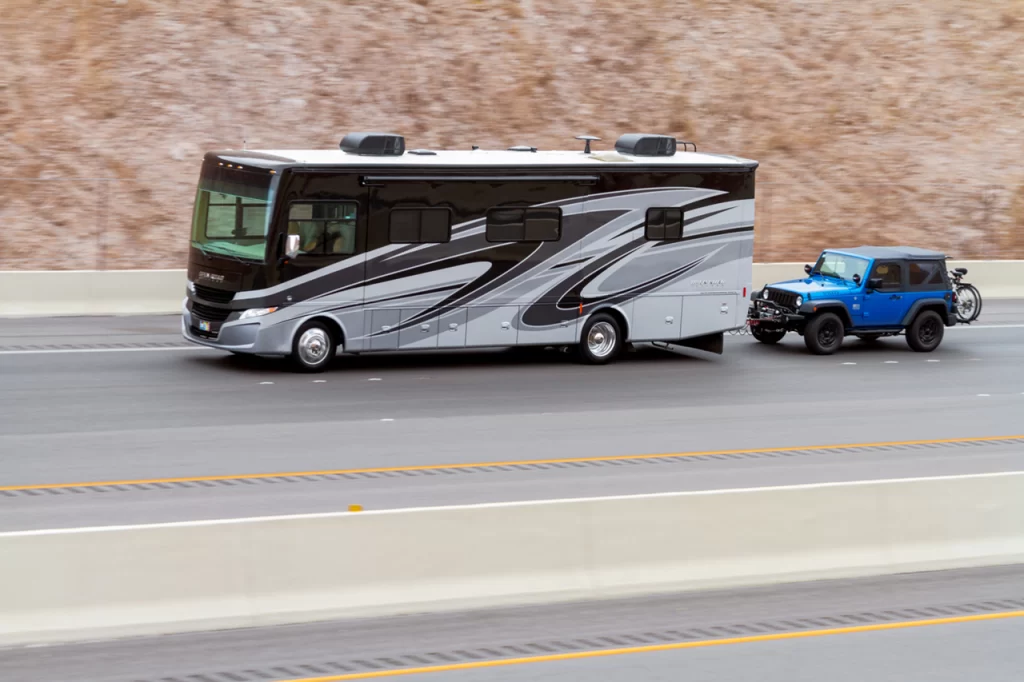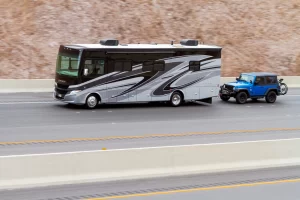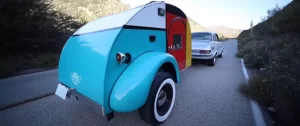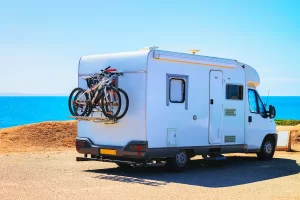It’s fairly common to see an RV traveling down the freeway with a smaller vehicle in tow. But is this a good practice? Before you decide to tow, there are several important factors to consider.
Why Would You Want to Tow a Car with an RV?
Towing a car with your RV offers numerous benefits. Once parked, having a car allows for easy trips to nearby attractions without needing to drive the larger RV. It also serves as a reliable option if your RV breaks down or if you and your travel companion have different plans for the day.
Towing a second vehicle provides the freedom to explore the open road on your terms, eliminating the need for costly rental cars or rideshare services after you park. While options like e-bikes, motorcycles, or golf carts can be appealing, many travelers find that a small car offers the best combination of convenience, comfort, and weather protection for longer excursions or family trips.
What Type of RVs Can Tow a Car?
Not all RVs are capable of towing vehicles, and the towing capacity varies based on the make and model. When in doubt, consult your RV’s owner manual to find its specific towing capacity, which indicates the maximum weight you can safely pull. It’s also essential to verify the weight of your vehicle before towing.
Several types of RVs can tow cars, assuming their manufacturers permit it and proper equipment is utilized:
- Class A: Typically, Class A motorhomes can tow up to around 10,000 pounds, but this can vary by model, so always check the manufacturer’s specifications.
- Class B: Most Class B motorhomes can tow smaller vehicles, usually under 5,000 pounds. However, since these models are more compact, not all are designed for towing, so verify before attempting.
- Class C: Class C motorhomes can generally tow between 3,000 and 8,000 pounds, depending on the specific model. As with other classes, always refer to the manufacturer’s guidelines.
Lastly, ensure that your RV is in good repair. Any wear and tear or engine issues can significantly impact your ability to tow safely.
How Big Does an RV’s Engine Need to Be to Tow a Second Car?
When manufacturers determine an RV’s towing capacity, engine size plays a crucial role. It’s essential to understand the maximum towing capacity for your specific RV model before towing a second vehicle.
The engine’s horsepower and torque are significant factors in its towing capabilities. Generally, a larger engine with higher horsepower and torque ratings will perform better when towing. However, it’s vital not to exceed the manufacturer’s towing limits, as pulling too heavy a load can lead to significant wear and tear on the engine, transmission, and braking systems.
Overloading your RV can result in mechanical failures, leading to costly repairs and making it more challenging to handle difficult driving situations, such as getting stuck in a rut. Always refer to your RV’s owner manual for precise towing specifications and ensure your engine is appropriately sized for the load you plan to tow.
RV Weight vs. Towable Weight
Before hitting the road, RV operators must understand several types of weight that affect their ability to tow. One key term is RV dry weight, which refers to how much your RV weighs without any fluids, cargo, or passengers. While this figure helps estimate the base weight, the towing capacity is more accurately determined by the RV’s Gross Combined Weight Rating (GCWR) minus the actual weight of the loaded RV (including passengers and cargo).
Towable weight refers to the maximum weight that your RV can safely tow, as specified by the manufacturer. For example, if your RV has a towing capacity of 8,000 pounds, it can tow a vehicle or trailer up to that weight—including any cargo in the towed vehicle.
Another important figure is the Gross Vehicle Weight Rating (GVWR), which is the maximum permissible weight for the RV, including passengers, fluids, cargo, and accessories. Additionally, you should keep the Gross Axle Weight Rating (GAWR) in mind to avoid overloading any of your RV’s axles. Staying within these limits protects your RV’s engine and overall performance while ensuring safe travel.
Restrictions on Towing by State
Many states have specific restrictions for towing behind an RV (or other vehicles). For example, in California, the total length of the RV and the vehicle or trailer being towed cannot exceed 65 feet. The maximum allowed width is 102 inches, and the height cannot exceed 14 feet. These restrictions vary by state, so it’s important to check your state’s regulations before you hit the road.
While some states, like California, limit towing vehicles to a maximum speed of 55 mph, other states allow higher speeds—typically up to 65 or 70 mph on highways. Always verify the towing speed limits for each state on your route to ensure safe and legal travel.
Options for Towing a Vehicle Behind Your RV
When it comes to towing a vehicle behind your RV, you have several options. The first step is ensuring you have the necessary equipment:
- Trailer Hitch: Most RVs come equipped with a trailer hitch, but if yours doesn’t, you may need to have one installed.
- Electrical Connections: Wiring must typically be connected between the trailer and the RV. This allows the brake lights, turn signals, and other essential functions to operate properly.
Once your RV is properly equipped, you can choose the best towing method for your vehicle:
- Flat Towing (Four Down): This method involves towing with all four wheels of the vehicle on the ground using a tow bar. It’s a popular option, but be sure to check if your vehicle’s transmission supports flat towing, as not all vehicles are compatible.
- Tow Dolly: In this method, the front wheels of the vehicle are lifted onto a small trailer while the rear wheels stay on the ground. This is typically used for front-wheel-drive vehicles.
- Car Hauler: The most expensive option, this involves towing the vehicle on a two-axle trailer, which lifts all four wheels off the ground. It’s ideal for all-wheel-drive vehicles or those that can’t be flat towed.
Purchasing or Renting Towing Equipment
If you’re new to towing a vehicle, consider renting the necessary towing equipment from U-Haul or another provider. Renting can be more cost-effective upfront and gives you the flexibility to try different methods without a long-term commitment.
However, if you plan to tow regularly, investing in your own towing equipment is a better option. This allows you to ensure the equipment is in good condition and select features that suit your specific needs.
Get Expert Help for Your RV at Leisure Coachworks
Whether you’re looking to upgrade your RV or add custom features to make towing easier, Leisure Coachworks is here to help. Our team specializes in modernizing RVs and can assist with tailored solutions to meet your needs. Contact us today to discuss custom upgrades for your RV.





